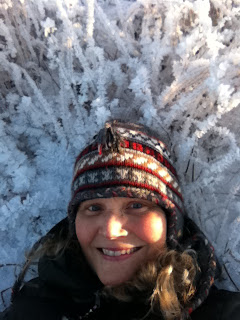My love, Craig, accuses me of being an extremist and I admit he's right. My current anti-cancer diet is evidence: no meat, no dairy, no sugar, no alcohol, no wheat. But the holidays, and a social life in general, challenges such rigidities. So when Don and Douglas invite us to dinner and make meatloaf, I eat it. And when the Winters invite us to a traditional Swedish Christmas Eve dinner, I load my plate with sauerkraut, homemade potato and meat sausages, Swedish meatballs, and after, chocolate cake. I share a macadamia nut martini with Craig, or a cosmo with my friend Ralph, who has Hep-C and also shouldn't drink. I don't tell friends who invite me for dinner of my private cancer phobias around food. My oncologist, Dr. S., once looked at me with dismay, I dare say sorrow, and asked, "So that means you don't treat yourself to an ice cream cone?" I'm lucky, because I love healthy food, vegetables, fruit, salmon, rice, tofu, miso, brick-like bread, gritty crackers. But I'm less obsessed about reading every study that suggests this or that food is good or bad in terms of cancer recurrence. So this morning's poem reflects the balancing act, the life of the mind at play with the life of the body. As I write these words, my love clears the ground for a flower garden outside my window with that big orange tractor that appears in the poem. I have the opposite of Hemingway's dutiful wife: my man calls me to come outside and plant beets. For his distracting and healing influence, I am grateful. (I am also grateful to poet Mary Ruefle's essay "Madness Rack and Honey" which also provided inspiration for this poem).
-->
12.27.2012 Prayer
Distracted by laundry on the
line, the physics of wind, which defines
whether a t-shirt wraps itself
into a cocoon or flaps like an injured
bird or dangles. By him watering
the eggplants. Distracted by his orange
tractor parked outside my
window. By remembrance of snows past.
By a hand of bananas, half-green
on the lanai. Distracted by the door
opening and him asking (not
caring) where to plant fennel, where
to move the hotly inedible
pepper tree. This is a prayer
for the war(p) between
a world lived on the page,
unseen, in the mind, and another, of trade wind,
o-bar, pick-ax, bleach. And
memory, singing in the choir loft, Our Lady
of Mr. Carmel, Lucille at the
organ, the opening mouths and chords to Let
there be peace on earth, and let
it begin with
me constructing a poem of leaves
and debris, leaving the
draft to cool, to load the dehydrator with bananas
and
holes in the ground with cassava and pigeon pea. To wield my shovel.
